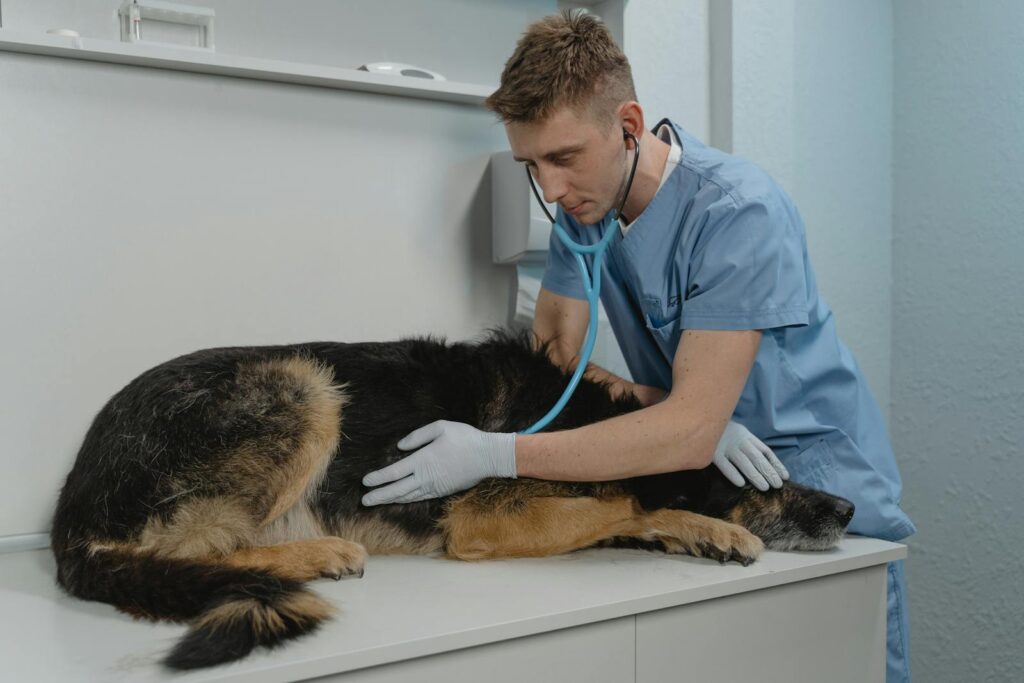Your dog’s wagging tail and endless enthusiasm are signs of a happy life, but what about a healthy heart? Just like humans, dogs can face heart-related issues, with studies showing that 10% of all dogs have some form of heart disease.
The good news? Many of these conditions are preventable with simple, loving care. As a dog parent, you stand out in your pup’s heart health journey. Let’s dive into 10 vet-approved, paws-on ways to keep your furry friend’s heart beating strong—so they can keep stealing your socks (and your heart) for years to come!
Table of Contents
1. Serve Up a Heart-Healthy Diet
Why it matters: A nutritious diet is the foundation of heart health. Foods rich in omega-3 fatty acids, lean proteins, and antioxidants support cardiovascular function, while excessive sodium or fillers can strain the heart.
How to do it:
- Opt for high-quality dog food with whole ingredients (look for AAFCO certification).
- Swap processed treats for heart-friendly snacks like blueberries or steamed sweet potatoes.
- Ask your vet about prescription diets if your dog has existing heart issues.
Pro Tip: “Think of your dog’s bowl like your own plate—balance is key!” says Dr. Sarah Mitchell, a veterinary cardiologist. Avoid table scraps high in salt or fat, which can silently stress the heart.
2. Get Those Paws Moving

Why it matters: Regular exercise strengthens the heart muscle, improves circulation, and keeps weight in check. A sedentary lifestyle, on the other hand, can lead to obesity—a major risk factor for heart disease.
How to do it:
- Tailor activities to your dog’s breed and age. A Border Collie might thrive on agility training, while a Bulldog prefers leisurely walks.
- Aim for 30–60 minutes of activity daily. Even indoor play counts!
- Watch for overheating or excessive panting, which signal it’s time to rest.
Real-Life Example: When Max, a 7-year-old Golden Retriever, started daily swims (a low-impact cardio dream!), his vet noticed improved heart function within months.
3. Never Skip Annual Vet Check-Ups

Why it matters: Early detection saves lives. Vets can spot subtle signs of heart trouble, like murmurs or irregular beats, long before symptoms appear.
What to expect:
- Stethoscope exams: Listening for abnormal heart sounds.
- Blood tests: Checking for heartworm or thyroid issues linked to heart disease.
- X-rays/Ultrasounds: If concerns arise, imaging provides a detailed heart “map.”
Pro Tip: Senior dogs (7+ years) or high-risk breeds (e.g., Cavalier King Charles Spaniels) may need bi-annual visits.
4. Maintain a Healthy Weight

Why it matters: Extra pounds force the heart to work harder. Overweight dogs are 2–3x more likely to develop heart disease.
How to help:
- Use a measuring cup for meals—eyeballing leads to overfeeding.
- Replace calorie-dense treats with veggies like green beans or carrots.
- Calculate your dog’s ideal weight with tools like the WSAVA Body Condition Score.
Stat Alert: The Association for Pet Obesity Prevention reports that 56% of U.S. dogs are overweight. Don’t let your pup become a statistic!
5. Prioritize Dental Hygiene
Why it matters: Gum disease allows harmful bacteria to enter the bloodstream, causing inflammation that damages heart valves.
How to fight plaque:
- Brush teeth 2–3x weekly with dog-safe toothpaste.
- Offer dental chews approved by the Veterinary Oral Health Council (VOHC).
- Schedule professional cleanings if tartar builds up.
Fun Fact: A 2020 study in the Journal of Veterinary Dentistry found dogs with clean teeth had a 20% lower risk of heart issues!
6. Dodge Hidden Toxins
Why it matters: Common household items—from certain foods to plants—can harm the heart.
Watch out for:
- Foods: Chocolate, xylitol (in sugar-free gum), grapes.
- Plants: Lilies, sago palms, oleander.
- Chemicals: Antifreeze, rat poison, some fertilizers.
Pro Tip: Dog-proof your home like you would for a toddler. Keep toxins out of reach and bookmark the ASPCA Animal Poison Control hotline.
7. Stay Consistent with Heartworm Prevention
Why it matters: Heartworms are transmitted by mosquitoes and can cause fatal blockages in the heart and lungs. Treatment is risky and expensive, but prevention is easy!
How to protect your pup:
- Administer monthly preventatives (oral or topical) year-round.
- Test annually for heartworms—early detection is critical.
- Reduce mosquito habitats (e.g., standing water) in your yard.
Vet Insight: “I’ve seen healthy dogs succumb to heartworm in just one missed dose,” warns Dr. Lisa Nguyen. Set phone reminders to stay on schedule.
8. Consider supplements (With Vet Approval!)

Why it matters: Some supplements support heart function, but others can interfere with medications. Always consult your vet first.
Popular options:
- Omega-3s: Reduce inflammation; found in fish oil.
- Coenzyme Q10 (CoQ10): Supports energy production in heart cells.
- Taurine: An amino acid crucial for certain breeds like Cocker Spaniels.
Note: Avoid “miracle cures” marketed online—stick to vet-recommended brands.
9. Keep Stress at Bay
Why it matters: Chronic stress raises cortisol levels, increasing blood pressure and heart strain.
Calming strategies:
- Create a safe space (a cozy crate or quiet room) during fireworks or storms.
- Use pheromone diffusers or calming supplements for anxious pups.
- Stick to routines—dogs thrive on predictability.
Heartwarming Hack: A 15-minute daily massage can lower your dog’s stress and strengthen your bond!
10. Know Your Dog’s Breed Risks
Why it matters: Genetics play a role. For example, Boxers are prone to arrhythmias, while Dachshunds often develop leaky heart valves.
Action steps:
- Research breed-specific risks with resources like the AKC Canine Health Foundation.
- Start screenings earlier for high-risk breeds.
- Share family health history with your vet if you adopted your pup.
Did You Know? Mixed breeds aren’t off the hook—they can inherit heart issues, too!
FAQ (Frequently Asked Questions)
1. What foods are good for a dog’s heart?
Opt for omega-3-rich foods like salmon, sardines, or flaxseed, lean proteins (chicken, turkey), and antioxidant-packed veggies (blueberries, sweet potatoes). Avoid salty or fatty treats. Always ask your vet before adding supplements like fish oil or taurine.
2. How can I slow down my dog’s heart failure?
Work closely with your vet to manage the condition. This often includes prescription medications (e.g., ACE inhibitors), a low-sodium diet, controlled exercise, and monitoring for fluid buildup. Never skip vet-recommended treatments.
3. How to avoid heart disease in dogs?
Prevent heart issues with a balanced diet, daily exercise, annual vet check-ups, dental care, and year-round heartworm prevention. Avoid obesity and toxins (e.g., chocolate, xylitol).
4. How do I know if my dog has a weak heart?
Watch for coughing (especially at night), lethargy, rapid breathing, fainting, or a swollen belly. Schedule a vet visit immediately—these could signal heart disease.
5. How can I check my dog’s heart?
At home, gently feel their pulse on the inner thigh (normal rate: 60–140 bpm, depending on size). Track resting breathing rate (<30 breaths/minute). For accurate checks, rely on your vet’s stethoscope exams, X-rays, or echocardiograms.
6. What age do dogs get heart failure?
It varies by breed. Small dogs (e.g., Cavaliers) may develop issues as early as 5–8 years. Larger breeds (e.g., Dobermans) often face heart problems later (7–10 years). Congenital defects can appear in puppies.
7. Are eggs good for a dog’s heart?
Yes! Cooked eggs (scrambled or boiled) are a great source of protein, vitamins, and healthy fats. Avoid raw eggs (salmonella risk) and limit to 1–2 eggs weekly to prevent weight gain.
8. How can I treat my dog’s heart disease at home?
Follow your vet’s plan strictly. At home, focus on a low-sodium diet, stress reduction, gentle exercise, and administering prescribed meds. Never try DIY treatments—heart disease requires professional care.
9. Is rice good for dogs?
Plain, cooked white or brown rice is safe and easy to digest, making it great for upset stomachs. However, it’s not a heart-healthy staple—prioritize protein and veggies instead. Avoid seasoned or fried rice.
Conclusion
Your dog’s heart does so much more than pump blood—it fuels every leap for a ball, every cozy snuggle, and every joyful “I missed you!” dance when you walk in the door. By embracing these 10 steps, you’re not just preventing disease; you’re investing in a longer, adventure-filled life together.
Remember: Small, consistent changes make the biggest impact. Pair these tips with heaps of love, and you’ll have one thriving, happy pup. Now, who’s ready for a walk? 🐾





